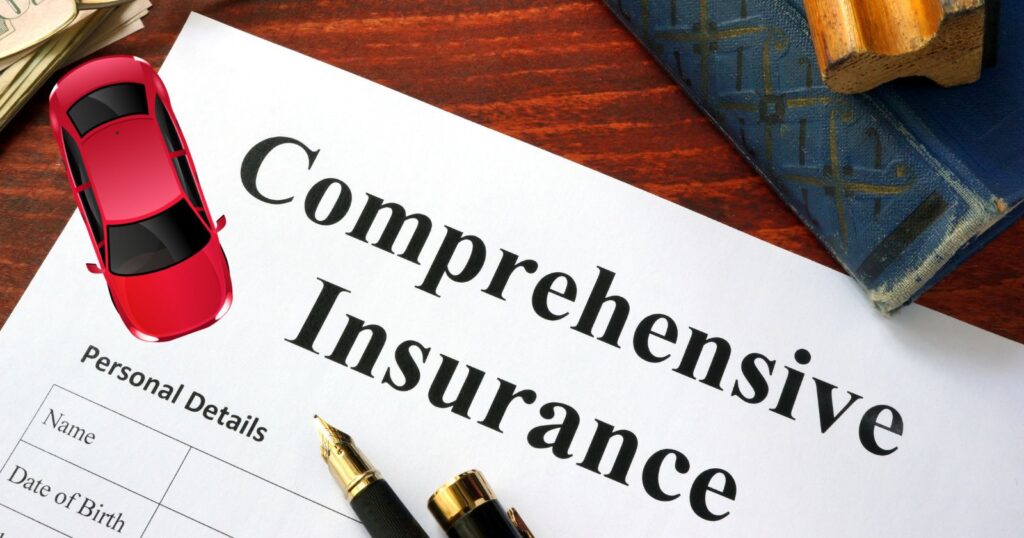Comprehensive Car Insurance: A Complete Guide
Table of contents
- What Is Comprehensive Car Insurance?
- The Coverage Spectrum of Comprehensive Insurance
- Deciphering the Benefits of Comprehensive Coverage
- Evaluating the Need for Comprehensive Coverage
- Understanding Premiums and Deductibles
- Navigating Claims and Coverage Limits
- Making an Informed Decision
- FAQs About Comprehensive Car Insurance
- Comprehensive Protection for Your Peace of Mind

In the intricate world of auto insurance, understanding the nuances of comprehensive car insurance is crucial for vehicle owners seeking full protection. This guide delves into what comprehensive car insurance covers, its benefits, and why it might be a necessary addition to your insurance portfolio.
What Is Comprehensive Car Insurance?

Comprehensive car insurance is an essential coverage that goes beyond the basics of collision insurance. It’s designed to protect drivers against a wide range of incidents that aren’t covered by standard policies, including theft, vandalism, natural disasters, and other non-collision-related damages. This type of insurance is pivotal for anyone looking to safeguard their vehicle from the unpredictable.
The Coverage Spectrum of Comprehensive Insurance
Comprehensive insurance acts as a safety net for various scenarios that could lead to significant financial loss:
- Theft and Vandalism: Offers peace of mind against the loss or damage caused by criminal activities.
- Natural Disasters: Protects against environmental damage from hail, floods, earthquakes, and more.
- Fire Damage: Covers repairs or replacement if your car is damaged by fire.
- Animal Collisions: Ensures coverage if an animal collision damages your vehicle.
Deciphering the Benefits of Comprehensive Coverage

Opting for comprehensive car insurance brings several advantages:
| Benefit | Description | Impact |
|---|---|---|
| Financial Protection | Covers the cost of repairs or replacement of your vehicle due to non-collision events. | Minimizes out-of-pocket expenses after incidents like theft, vandalism, or natural disasters. |
| Peace of Mind | Comprehensive coverage ensures your vehicle is protected against a wide range of risks. | Reduces stress and worry about potential financial loss due to unexpected damages. |
| Loan and Lease Requirements | Many lenders require comprehensive coverage for financed or leased vehicles. | Meets contractual obligations and protects the lender’s or lessor’s investment. |
| Enhanced Resale Value | Maintaining comprehensive coverage can contribute to keeping your vehicle in good condition. | May increase the resale value of your vehicle by ensuring it’s well-maintained and repaired after incidents. |
| Customizable Coverage | Comprehensive insurance allows for customization of deductibles and coverage limits. | Enables policyholders to tailor their coverage to fit their specific needs and budget. |
Evaluating the Need for Comprehensive Coverage
While comprehensive insurance offers extensive protection, it’s not mandatory for all drivers. Consider the following factors to determine if it’s right for you:
- Value of Your Vehicle: More crucial for new or high-value cars.
- Risk Exposure: Essential if you live in areas prone to theft, vandalism, or natural disasters.
- Personal Financial Situation: Worth the investment if potential out-of-pocket repair costs exceed the premium.
Understanding Premiums and Deductibles

When it comes to comprehensive car insurance, premiums and deductibles are two critical components that directly influence each other and the overall cost of your policy. Premiums are the amount you pay periodically to keep your insurance active, while deductibles are what you pay out of pocket before your insurance kicks in after a claim. The price of premiums is influenced by various factors, such as the make and model of your vehicle, your driving record, and even the area where you live. Insurers assess these elements to determine the risk level of insuring you and your car.
Choosing a higher deductible is a common strategy for lowering your monthly or annual premium costs. This approach makes sense for drivers who believe they are at a lower risk of filing a claim and are willing to pay more upfront in the event of an incident. However, it’s essential to strike a balance that won’t leave you financially strained if you need to file a claim. Carefully assessing your financial situation and risk tolerance is crucial when setting your deductible. By understanding how premiums and deductibles work together, you can make informed decisions that optimize your coverage and cost-effectiveness.
Navigating Claims and Coverage Limits
When it comes to comprehensive car insurance, the process of filing a claim follows a path similar to that of other insurance types. This often involves submitting detailed documentation of the damage, and in cases like theft or vandalism, a police report may be necessary. The aim is to provide your insurer with enough information to assess and approve your claim, ensuring you receive the compensation covered under your policy.
Understanding the coverage limits of your comprehensive car insurance policy is crucial. These limits determine the maximum amount your insurer will pay for a covered claim. It’s important to ensure that these limits adequately reflect the value of your vehicle and meet your personal coverage needs. Regularly reviewing and adjusting your coverage can help protect you against significant financial loss in the event of unexpected damage to your car.
Making an Informed Decision

Choosing the right comprehensive car insurance policy involves comparing quotes, understanding coverage options, and considering your unique needs. It’s advisable to consult with insurance professionals to find a policy that offers the best balance of coverage and cost.
FAQs About Comprehensive Car Insurance
- Is comprehensive insurance worth it for older cars?
- It depends on the car’s value and your financial situation. If the car’s value is low, you might opt out to save on premiums.
- Can I cancel my comprehensive coverage if my car is paid off?
- Yes, you can cancel your comprehensive coverage once your car is paid off, but consider if the benefits outweigh the risks.
- Does comprehensive insurance cover other drivers?
- Comprehensive insurance covers damages to your vehicle, not who’s driving. Liability coverage addresses damages to others.
- How does comprehensive insurance differ from collision insurance?
- Comprehensive covers non-collision damages (theft, weather, etc.), while collision covers damages from accidents with vehicles or objects.
- Will comprehensive insurance cover windshield damage?
- Yes, comprehensive insurance typically covers windshield damage and repairs, often without a deductible for glass repairs.
Comprehensive Protection for Your Peace of Mind
Comprehensive car insurance is an invaluable part of your auto insurance portfolio, offering broad protection against a range of non-collision incidents. By understanding what comprehensive coverage entails and assessing your individual needs, you can ensure your vehicle, one of your most significant investments, is adequately protected against the unexpected.







